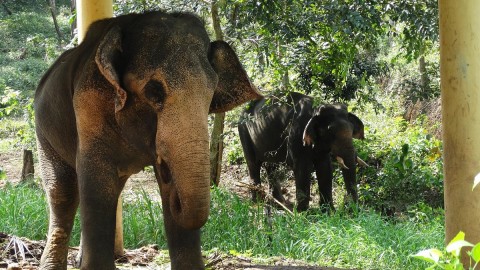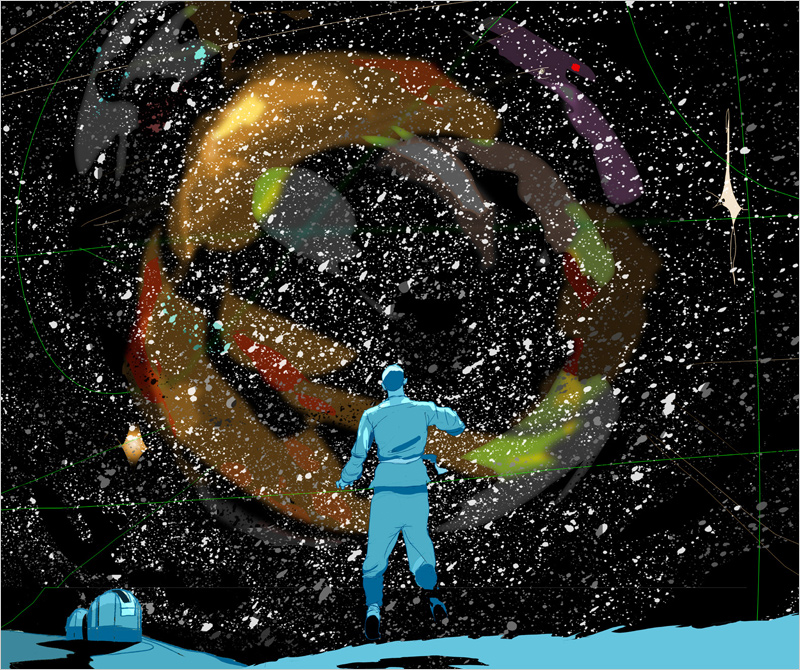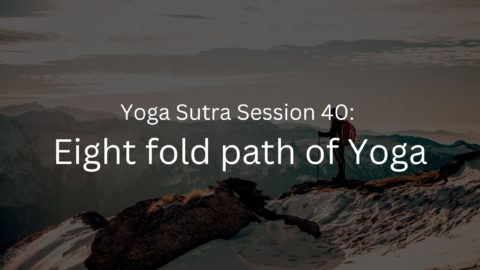Then what is awareness? Awareness is to be aware that you are not the body, not because the Upanishads say so or Patanjali says so – because you can cram it into your mind that you are not the body. You can go on repeating every morning and evening, ‘I am not the body’ – that will not help. It is not a question of repetition, it is a question of deep understanding. And if you understand, what is the point of repeating?
Once a sannyasin, a Jain monk stayed with Osho. Every morning he would sit and chant a Sanskrit mantra: I am not the body, I am not the mind; I am the purest Brahma. He chanted and chanted and chanted for one and a half hours every morning. On the third day Osho said to him, ‘Have you not known it? Then why do you chant? If you have known it, it is foolish. If you have not known it, it is again foolish because just by repeating how can you know?’ If a man goes on repeating, ‘I am a man of great potential, sexual potential,’ you can be certain that he is impotent. Why repeat, ‘I am a man, and very potent and powerful?’ And if a man repeats this for one and a half hours every morning, what does it mean? It shows that something that is just the opposite is in the mind; deep down he knows that he is impotent. Now he is trying to befool himself with, ‘I am a very powerful man.’ If you are, you are. There is no need to repeat it. Osho told the Jain monk, ‘This shows that you have not known. This is a perfect indication that you are still identified with the body. And by repeating, how can you get out of it. Understand that repetition is not understanding.’
To understand, watch. When hunger comes, watch whether it is in the body or in you. When illness comes, watch where it is, in the body or in you. An idea comes, watch where it is, in the mind or in you. A feeling arises, watch. By being more and more watchful you will attain awareness. By repetition nobody has ever attained.
EGOISM IS THE IDENTIFICATION OF THE SEER WITH THE SEEN.
You are there behind your eyes, just standing as if someone is standing behind a window and looking out. The man who is looking out of a window is just like you, looking out of the eyes towards me. But you can get identified with the eyes, you can get identified with the seeing. Seeing is a capacity, a vehicle. Eyes are just windows; they are not you.
Patanjali says, ‘Through the five senses you get identified with the vehicles, and then out of these five arises the ego.’ Ego is the false self. Ego is all that which you are not and you think you are.
A man standing in the window starts thinking that he is the window. What are you doing behind the eyes? – You are looking through the eyes. Eyes are the windows, ears are the windows; you are hearing with the ears. You stretch your hand towards me and I touch you; hand is just a vehicle. You are not the hand.
And this you can watch, and this you can experiment with.
Many times it happens that something happens just in front of your eyes and you miss. Sometimes you have read the whole page and suddenly you become aware that you have been reading, but you have not read a single word. You don’t remember what you have read, and you have to go back. What happened?
If you were the eyes how could this be possible?
You are not the eyes. The window was vacant, looking at the page. The consciousness behind the window was not there, it was engaged somewhere else. The attention was not there. You may have been standing at the window with closed eyes, or your back was to the window, but you were not looking out of the window. It happens every day – suddenly you realize that something has happened and you have not seen, you have not heard, you have not read. You were not there, you were somewhere else thinking some other thoughts, dreaming some other dreams, moving in some other worlds. This window was empty; only eyes were there.
Do you know the empty eye? Go and see a madman; you can see an empty eye there. He looks at you and doesn’t look. You can see that he looks at you and he is not looking at you at all. His eyes are empty. Or you can go to a saint who has achieved; his eye again is also empty. It is not like the madman’s, but something similar to it – he looks through you. He does not stop at you, he goes beyond you. Or he looks not at your body, but at you. He penetrates: he leaves your body, your mind, your heart and he simply jumps on you. And you don’t know who you are.
That is why a saint’s look seems to be going through you. He does not stop at you, because for the saint, the ego that you think you are is not you. He bypasses the ego; he simply looks into you. A madman looks with an empty eye because his consciousness is not there. A saint also appears to be looking with an empty eye, because his consciousness is absolutely there. And he penetrates you so deeply, to the very depths of your being where you have not reached yet. That’s why he looks as if he is not looking at you, because the you that you are identified with is not the reality for him, but the you that you are not aware of is the reality for him.
Egoism is the identification of the seer with the seen, with the vehicle. If you drop identification with the vehicles, ego drops. And there is no other way to drop the ego. Don’t get identified with the body: eyes, ears, mind, heart, and suddenly there is no ego. You are, in your total purity, but there is no ego there.
You are for the first time in your total presence, but no ego is there, no ‘I’ process, nobody saying, ‘I am.’
ATTRACTION, AND THROUGH IT, ATTACHMENT, IS TOWARDS ANYTHING THAT BRINGS PLEASURE. REPULSION IS FROM ANYTHING THAT CAUSES PAIN.
These are your two ways of being here in the world: you are attracted, towards something which you feel causes pleasure, you feel repelled, repulsed by something which you think causes pain. But if you become more and more alert, you will have a total mutation. You will be able to see that whatsoever causes pleasure also causes pain – pleasure in the beginning, pain in the end.
Whatsoever causes pain also causes pleasure – pain in the beginning, pleasure in the end. These are the two ways in the world.
One is the way of the householder. Try to understand it – it is very, very significant. One is the way of the householder, the grihastha. He lives through attachment, attraction. Whatsoever he feels will cause pleasure. He moves towards it. He clings to it and finally he finds pain and nothing else, anguish and nothing else.
Just the opposite is the way of the monk, one who has renounced the world. He does not cling to pleasure. On the contrary, he starts clinging to paid, austerities, torture. He lies down on a bed of thorns, goes on a long fast, stands for years, does not sleep for months. He does just the opposite because he has come to know that whenever there is pleasure in the beginning, in the end there is pain.
He has reversed the logic; now he seeks the pain. And he is right – if you seek pain there will be pleasure in the end.
But a man who practices pain becomes incapable of feeling pain. A man who practices pain becomes incapable of pleasure for small things, just small things.
You cannot understand. For a man who has been fasting for a month, ordinary bread and butter and salt is such a great feast. A man who has been lying down on thorns, if you allow him to lie down just on the ground, on the plain ground, no emperor could sleep so beautifully.
But both are two aspects of the same coin, and both are wrong. The monk has just reversed the process: he is standing in a shirshasana, a head stand, but he is the same man. Both are attached: one is attached to pleasure, the other is attached to pain.
A man of awareness is unattached. He is neither a grihastha, a householder, neither is he a monk. He does not move to the monastery and he does not go to the mountains. He remains wherever he is – he simply moves ‘with inwards’. On the outside there is no choice for him. He does not cling to pleasure and he does not cling to pain. He is neither a hedonist nor a self torturer. He simply moves ‘with inwards’ looking at the game of pleasure and pain, light and shadow, day and night, life and death. He moves beyond both. Because there is duality, he moves beyond both, he transcends both. He simply becomes alert and aware, and in that awareness for the first time something happens which is neither pain nor pleasure, but which is bliss. Bliss is not pleasure; pleasure is always mixed with pain. Bliss is neither pain nor pleasure, bliss is beyond both.
And beyond both you are. That’s your nature, your purity, your crystal purity of being – just a transcendence. You live in the world but the world is not in you.
You move in the world but the world doesn’t move in you. You remain untouched wherever you are. You become a lotus flower.
Tags: Patanjali Yoga Sutra 17 Total Presence










